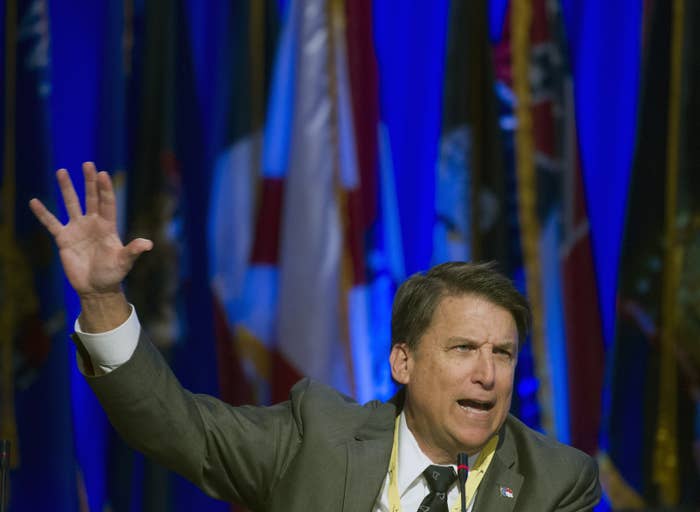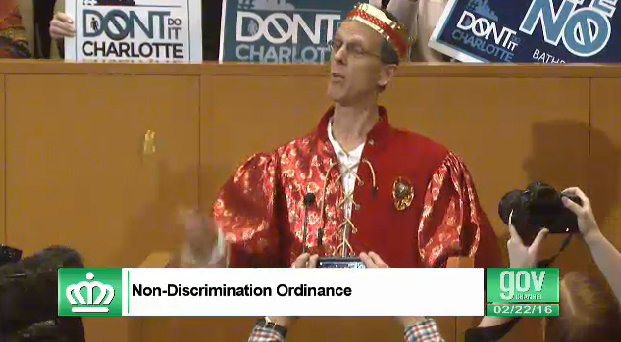
The Charlotte City Council passed an LGBT nondiscrimination bill on Monday night in a 7 to 4 vote — leading top North Carolina Republicans on Tuesday to threaten state legislation that would negate the city ordinance.
Gov. Pat McCrory had told city officials in an email one day before the vote that state lawmakers may take “immediate” action to block Charlotte's new policy.
The state's Speaker of the House, Tim Moore, followed up Tuesday morning to announce he would work with fellow Republicans to explore a "legislative intervention to correct [Charlotte's] radical course.”
Both leading Republicans argued the bill would present safety risks by allowing transgender people into restrooms that correspond with their gender identity.
In a statement Tuesday afternoon, Gov. McCrory said legislators had told him they are planning a bill to block the LGBT nondiscrimination ordinance not only in Charlotte, but also in any other jurisdiction in the state that passed a similar policy.
"As I communicated and predicted prior to the vote, state legislative leaders have notified me about introducing legislation that would correct this misguided government regulation and ensure it will not happen in any town or city in North Carolina," McCrory said.
“I am disappointed and saddened Charlotte city government initiated overreaching regulations that change basic standards and expectations of privacy regarding restrooms and locker rooms," he added.
"As governor," he continued, "I will support legislative action to address this regulation and will remain committed to protecting the privacy and safety of all men, women and children of all ages in North Carolina. My position is consistent with challenging government overreach by the federal, state and now a local government."
Both McCrory and Moore declined to elaborated on how, specifically, such a bill would work.
However, several sources told BuzzFeed News the state could follow in the steps of Arkansas, where legislators passed a bill last year that preempts local jurisdictions from enacting nondiscrimination policies that extend beyond state law.
That sort of clash in North Carolina could tee up a rancorous partisan showdown that pits a state capitol run by Republicans against city hall controlled by Democrats.
Furthermore, it could make Charlotte the latest flashpoint for the national LGBT movement, which has struggled to pass nondiscrimination laws since winning marriage equality at the Supreme Court last year.
The Charlotte ordinance, which is slated to take effect in April, bans discrimination on the basis of sexual orientation, gender identity, and gender expression in housing and places of public accommodation. (State law does not allow cities to ban workplace discrimination.)
Charlotte City Councilmember John Autry supported the measure, telling BuzzFeed News before the vote it protects vulnerable citizens from discrimination. But if the state tried to challenge the law, he said, “We have no legal leg to contest it with.”
Autry said North Carolina law empowers the state with strong control over jurisdictions, allowing it to “preempt our authority. If the state wanted to, they could come here to the government center, fire all of us, send us home, and run the city themselves.”
We have a full house. Lots of people heading to the overflow space. #cltequality #clt #citycouncil
More than 100 people packed a council hearing before the vote. Self-identified Christian conservatives, many furious, expressed fear the nondiscrimination law would allow transgender people — and men posing as trans — to sexually assault women in restrooms. They also worried about their religious freedom, saying the bill would force them to promote LGBT values in violation of their faith.
One man — dressed up as a king and waving a scepter — mocked transgender people by proclaiming, “I identify as gender royal … Anyone who does not bow and call me your highness shall be fined.”
When the man refused to stop yelling, Mayor Jennifer Roberts threatened to have him removed from the room. She also asked anti-transgender speakers to show “human decency.”

One woman compared transgender people to someone who thinks they are a bird or cat, while another compared transgender people to drivers traveling the wrong direction on freeways.
In contrast, a transgender woman told the council she was afraid to be there, while others said LGBT rights were part of a decades-long civil rights movement. Supporters of the bill said perverted characterizations of transgender people only underscored the need to protect transgender people from discrimination.
“Conservative people, led by a lot of religious factions, have tried to characterize transgender people as sex offenders, perverts, pedophiles, or all of the above,” Councilmember Autry said in phone call before the vote. “Show me the evidence that supports your assertion. I haven't seen it. I think it’s about discrimination, and if you can deny the rights of our most vulnerable citizens, then you can just as easily work to deny the rights of other factions.”
There are no documented cases in the 17 states and 225 other cities with such laws on the books of people using the policies for nefarious purposes, but the bathroom attack has been a potent argument for blocking and repealing LGBT nondiscrimination laws.
Last fall voters in Houston, Texas, repealed the city’s nondiscrimination bill and just this month the city council in Jacksonville, Florida, withdrew a similar bill. The assembly in Anchorage, Alaska, passed a similar law and citizens are attempted to repeal it.
In all of those cities, as in Charlotte, critics hammered on a message that the nondiscrimination ordinance would allow transgender women — who they tend to describe as men — to sexually prey in women by claiming they are protected on the basis of gender identity in public restrooms and locker rooms.
That was also a leading argument in South Dakota, which last week became the first state to pass a bill banning transgender students from using restrooms and locker rooms that correspond with their gender identity. The bill awaits the governor’s signature.
In North Carolina, Gov. McCrory contended in his email that the ordinance tried “to solve a problem that does not exist,” adding that the bill may create “major public safety issues by … allowing a person with male anatomy, for example, to use a female restroom.”
The bathroom issue was also flashpoint in Charlotte last year, when the council narrowly rejected a similar bill. Since then, two Democrats on the council who voted against the bill were replaced by Democrats who voted yes on Monday. Equality North Carolina, an advocacy group, had helped support pro-LGBT candidates.
It's unclear how soon the the state could attempt to override Charlotte's law. The General Assembly, which is currently out of session, could hold an extra session or take up the issue when they reconvene in spring.
Moore appeared unlikely to pursue immediate action, as the governor suggested. A spokesperson for his office told BuzzFeed News the speaker would prefer a bill during the legislative session that convenes April 25, rather than immediately summoning lawmakers to the capitol.
One state lawmaker, Rep. Dan Bishop, also sent city officials a letter this month claiming the city lacked legal authority to pass a nondiscrimination ordinance because the state never delegated that power to municipalities.
